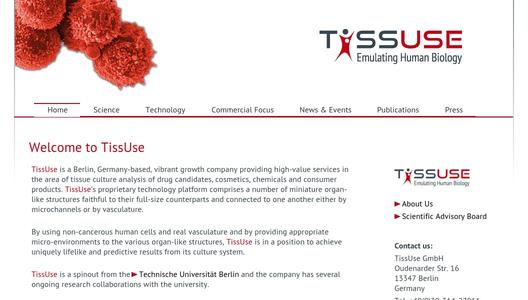“This makes NIFDC the first authority in the world to test the Multi-Organ-Chips independently and to use this technology with self-established assays to intervene in the development cycle”, explains Uwe Marx, inventor of the technology and CEO of TissUse GmbH founded as a spin-off of the TU Berlin in 2010.
The Multi-Organ-Chip technology currently makes it possible to replicate up to four human organs, scaled down 100,000 times, from cell tissue on a microscope slide. They are connected to each other with a system similar to blood vessels. Micro valves replicate the heart and the cell structures react to administered substances just like a human organism.
Experiments for testing new drugs, cosmetic ingredients and chemicals thereby do not need animal testing any more and developers as well as regulatory authorities can test how humans react to specific substances over longer periods of time. According to Marx, the use of human cells also allows the results to be transferred more easily than data from animal testing.
About TU Berlin:
The Technische Universität Berlin (TU Berlin) is one of the oldest technical universities in Germany. With more than 32,000 students in 100 degree programmes, the university ranks among the largest universities in Germany. In addition to the university’s faculties and institutes, there are numerous collaborative research centres and major research networks. More than 177 million Euro in third-party funding were acquired by TU Berlin in 2015.
Technische Universität Berlin
Office of Press, Public Relations and Alumni
Straße des 17. Juni 135
10623 Berlin
Germany
Tel.: +49 (0)30 314 23922 or -22919
Fax: +49 (0)30 314 23909
About NIFDC:
National Institutes for food and drug Control (NIFDC), founded in 1950, is a subordinate agency of the China Food and Drug Administration (CFDA) and there are more than 50 departments and divisions within NIFDC. The main professional areas of NIFDC cover pharmaceutical products, biological products, medical devices, food, healthy food, Cosmetic, reference standards, laboratory animals, and drug safety evaluation etc. More than 800 different testing items could be performed in NIFDC. Each year, more than 13,000 batches of drugs are tested in NIFDC and more than 2,900 reference standards are distributed by NIFDC. Currently, there are more than 1000 employees including 800 technical staffs and more than 9800 modern testing instruments and equipment in NIFDC, with the total asset value of more than 400 million RMB.

